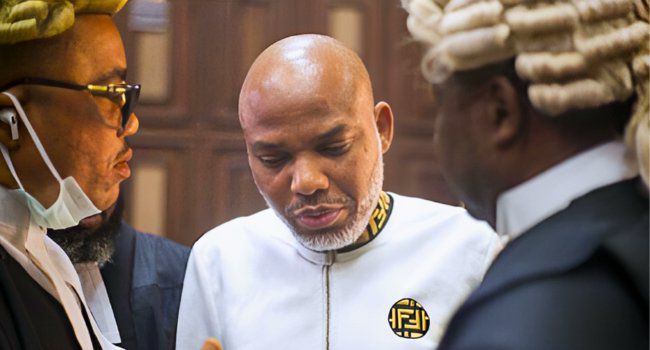Kenyan court declares Nnamdi Kanu's transfer to Nigeria illegal, IPOB reacts

Kenyan Court Deems Nnamdi Kanu's Transfer to Nigeria Illegal; IPOB Reacts In a significant legal development, the High Court of Kenya, convened in Nairobi, has declared the detention and subsequent transfer of Nnamdi Kanu, leader of the Indigenous People of Biafra (IPOB), from Kenya to Nigeria as unlawful and illegal. The ruling, delivered on June 24, 2025, has drawn strong reactions and ignited discussions about international law, human rights, and state accountability.
Court Condemns Actions of Kenyan and Nigerian Governments Presiding Judge Justice E.C. Mwita issued a scathing condemnation of both the Kenyan and Nigerian governments, citing gross violations of Kanu's fundamental rights. The court awarded Kanu 10 million Kenyan shillings in compensatory damages, to be paid jointly by the two governments, as restitution for the violations.
The case revolves around Kanu's arrest in Kenya in June 2021 and his subsequent extradition to Nigeria. Kanu had previously fled to Kenya following a military operation at his family compound in Abia State, Nigeria.
Legal Basis for the Ruling Justice Mwita emphasized that Kanu, having lawfully entered Kenya, was entitled to the protections afforded by the Constitution of Kenya 2010. The judge asserted that the Kenyan government had a constitutional obligation to uphold and protect his rights and fundamental freedoms. "The government of Kenya violated the Constitution and Mr. Nnamdi Kanu’s rights and fundamental freedoms. Having entered Kenya lawfully, he was subject to the protection offered by the Constitution of Kenya 2010. However, he was abducted, kept in solitary confinement, tortured, and forcibly removed from Kenya without following the law," the Judge stated.
IPOB's Reaction: Vow for Global Accountability IPOB, through its spokesperson Emma Powerful, issued a statement on June 27, 2025, characterizing the court's ruling as a "resounding judicial earthquake" that vindicates their long-held position regarding Kanu's "illegal rendition." The group alleges that the Nigerian and Kenyan governments engaged in a criminal act of state-sponsored international terrorism and vowed to pursue global accountability for all parties involved.
The IPOB statement further described Kanu's transfer as an "extraordinary rendition" orchestrated by Nigerian and Kenyan security agencies. "He was abducted in broad daylight at Jomo Kenyatta International Airport, chained, tortured, and flown illegally to Abuja without any extradition hearing or judicial warrant," the statement claimed.
IPOB expressed gratitude to Professor PLO Lumumba, lead counsel in the Kenyan litigation, and Justice Mwita for their "courage, clarity, and tenacity" in delivering the judgment. The group also stated that the verdict places a "permanent legal stain" on the records of former presidents Uhuru Kenyatta of Kenya and Muhammadu Buhari of Nigeria, along with their alleged accomplices.
Historical and Current Context Nnamdi Kanu and IPOB have been advocating for the secession of Biafra from Nigeria. The movement has gained significant traction among certain segments of the population in southeastern Nigeria. Kanu's arrest and detention have been a contentious issue, sparking protests and raising concerns about human rights and due process.
The concept of "extraordinary rendition," as alleged by IPOB, has a controversial history in international relations, particularly in the context of counter-terrorism operations. It involves the transfer of individuals from one country to another without formal extradition proceedings, often raising concerns about potential human rights abuses.
Expert Analysis: Implications of the Ruling Dr. Anya Obi, a Senior Lecturer in International Law at the University of Lagos, commented on the ruling: "This verdict underscores the importance of upholding constitutional rights and due process, even in cases involving individuals accused of serious offenses. It sends a strong message that governments cannot operate outside the bounds of the law in their pursuit of security objectives. The implications for international cooperation on security matters are significant, as it highlights the need for adherence to legal frameworks and respect for human rights."
Similarly, human rights analyst, Barrister Folake Shittu, noted, "The Kenyan court's decision could embolden other individuals and groups facing similar circumstances to challenge their detention and transfer in foreign jurisdictions. It also places increased scrutiny on the human rights records of both Nigeria and Kenya and may impact their international standing."
Looking Ahead The Kenyan court's ruling is likely to have far-reaching consequences. It remains to be seen how the Nigerian and Kenyan governments will respond to the judgment and whether they will comply with the court's orders regarding compensation and potential further legal action. The case is expected to continue to generate significant interest and debate within Nigeria and internationally.
Originally sourced from: pulse Ng
